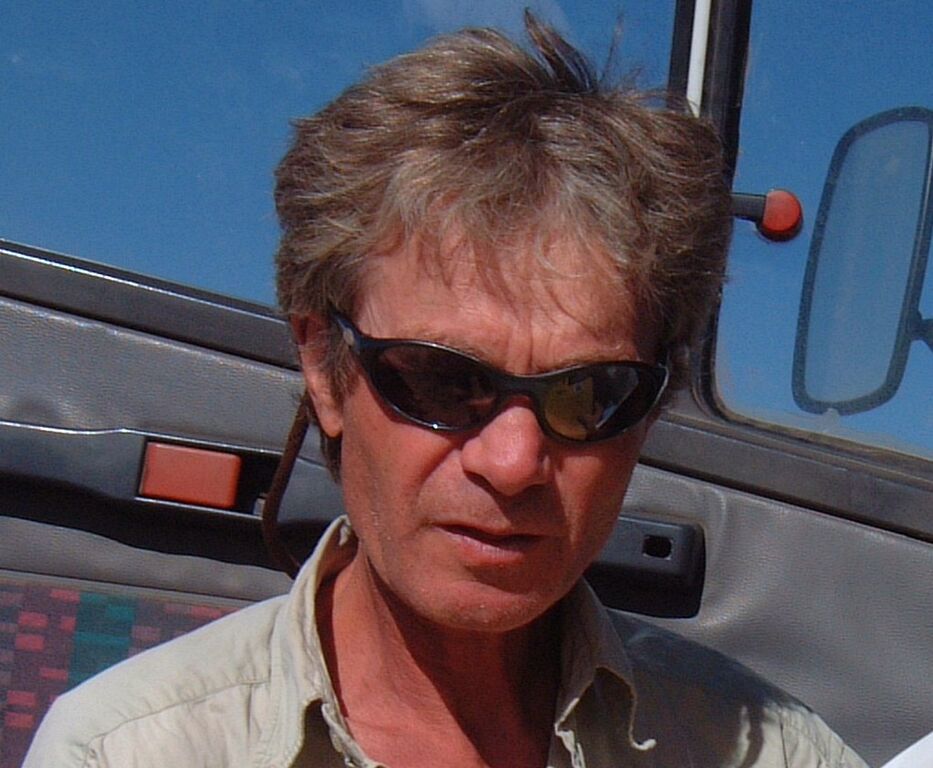
Henry Gold, founder Tour D’Afrique. All photos courtesy Tour D’Afrique.
Most people facing unemployment at the age of 50 would turn towards the safety and comfort of what they know to get back on their feet. When Henry Gold was in that position, he decided to lead a four month bicycle expedition from Cairo, Egypt to Cape Town, South Africa and organize a race on the same route despite having never bike toured or raced a day in his life at that point. Gold thought his adventure was going to be a one-time thing. Instead, it gave launch to his bike touring company, Tour D’Afrique. Twelve years on, the company offers 10 expeditions and races on six continents. I spoke to Gold about his history working with NGOs around the world, the African bike-manufacturing project he tried to start that helped inspire Tour D’Afrique, the joy and challenges of leading multi-month bike expeditions, and much more.
Let’s start with the launch of your company. Why lead a cycling expedition through Africa?
I suppose I reached an age where I figured if I wanted to do something very unusual, this was the time to do it. Literally when I turned 50 I had a project that fell apart. I said, what now? I had this desire to do this huge tour. I had a fellow who was interested in doing this 10 years earlier, but that fell apart because of some security issues that were happening in Egypt. So 10 years later I picked up the phone and said Michael are you still interested in this project because it’s now or never. I had the time and opportunity to do it. He said yes and the rest is kind of history.
What was that very first tour like?
We decided to do something that was never really done before. I’m not even sure anyone had crossed Africa by bicycle completely from top to bottom without getting into cars or trains or whatever before. There was a lot of apprehension, a lot of misinformation that this thing wasn’t going to be feasible. And it wasn’t really feasible in a way because there were all kinds of areas under military control and nobody could get permits at the time. Because I had worked in Africa I had an inkling it could be done with the right approach. We did manage to get them and we were the first ones trying this. First ones crossing borders on bicycles. First ones crossing certain dangerous areas. And every day was a success. When we would come into camp at the end of a day and nothing unusual had happened, me and my partner would have a glass of wine and say, “another day.” It was very, very exciting.
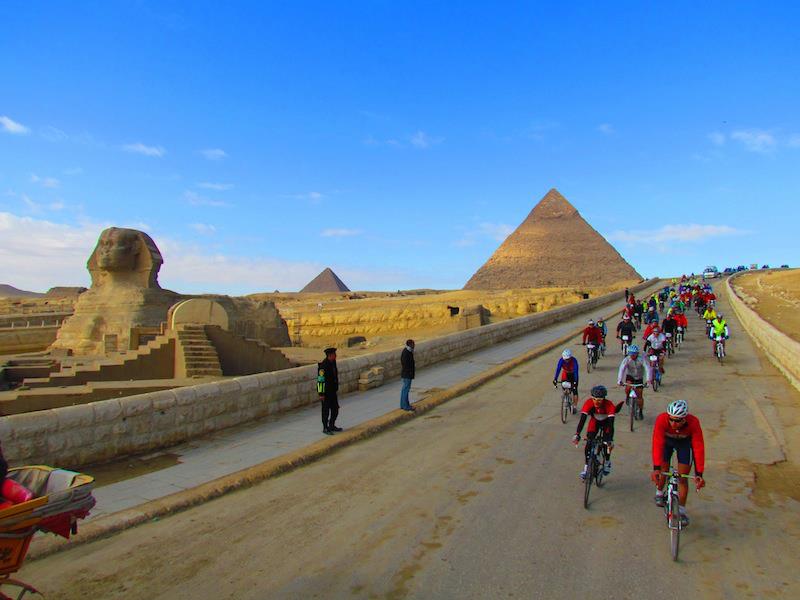
Tour D’Afrique riders pass the Egyptian Pyramids at the start of the 2013 expedition.
Had you been a bike tourist before this?
Not at all. I had no background in cycling. I had an interest in cycling as a commuter. I always thought that cycling was a solution to commute issues: congestion, transportation challenges. I thought cars as a whole were a waste of energy and environmental cost. I was involved in environmental and development issues like this before. I ran an NGO in Africa for many years. That was my background. I was more interested in this as a solution to problems rather than interested as a tourist or a racer or anything.
I grew up in eastern Slovakia. There used to be a major race through the little town I lived in. Of course as a kid I had a bike and pretended I was a racer.
What then made you think to do a bike tour like this through Africa?
Well, it wasn’t something I’d dreamed of. When I worked in Africa, one of the things I saw was that there were very serious transportation problems. In many, many places whatever you could carry on your back or on a donkey or a horse, that was your only transport option. Knowing about bicycles from my childhood in eastern Europe and knowing how popular they are in China and Asia, I thought there could be a bicycle revolution to start moving things and empower. Obviously a bicycle can carry two or three times what you can carry on your back. You expand your market capability. Instead of a farmer being limited to what he can carry on his back 10-15 miles a day, he could extend to markets twice or three times the distance. I got interested in what it would take to set up a manufacturing facility in Kenya. And we kind of got going on this particular project and it looked promising. We started thinking how we’re going to market this. But we had no money to run the operation, let alone marketing. We found a few small investors to keep us going and I was wondering how I was going to market this. I had a flash of inspiration one day and thought since we didn’t have money to get attention, maybe we could create this crazy event that’ll get everyone to talk about us and that way they’ll be talking about and the bicycles. That’s the concept of Cairo to Cape Town as a result of this project.
Unfortunately my partner in the cycling venture changed his heart and got cold feet and I was involved in too many other things at the time and it never went anywhere. In the meantime I met someone else interested in just the adventure aspect of it. He was producing some hardware here in Toronto. And he was a racer.
How do you describe Tour d’Afrique to people who don’t know about it?
We take on massive expeditions on bicycles through places and areas of the world that people generally don’t want to go by themselves. We act as enablers to cross continents by bicycle. Enablers in the sense that a lot of people like cycling and a lot of people like to do long distances, but they’re either not able or willing to take the efforts to organize or they prefer group travel or whatever. We enable people to do what they would never do otherwise.
Most people would not do this anyways, but there’s a small group of people who would if you provide support and infrastructure and that’s what we do. We try to make it fun. And in addition to the tours we have a race. People who are into cycling hard and racing and competing with each other we allow them to do that. Other people want to take their time and visit places and ride every inch of every day. We create an environment for a cross section of people from the youngest to the oldest, males, females to really aggressive riders and people who have never done anything like this. It’s great fun. It’s a great challenge. It opens people up to the possibilities of what they can do. It gives them a lot of satisfaction. You name it. I could keep going on and on.
Have the tours changed over the years?
The company has grown. We started with the Africa tour. I thought it was going to be a once-in-a-lifetime thing, but in the back of our minds, my partner and I thought maybe this could be run as a business. And through the first trip people started asking me what I was going to do next. I was a little shocked that people who just spent four months of their lives riding would want to do something like this again. Right there on the spot I told them to keep a look out for the next tour. We now have 10 expeditions. Seven of them are major, meaning over three months. Then we have three tours that are three weeks to nine weeks. So the company has grown. There’s many more people involved, of course. We have learned quite a few things.
But essentially it’s still the same concept. The same way we did it then, we do it now. Some of the trips now are more comfortable because we go through areas where we stay in hotels. The Africa trip we’re still camping. But Africa has changed. Ten years ago there were no supermarkets for three or four countries in a row. Now you can find them everywhere. The roads have improved in some areas. At some points we take riders off the major roads because the danger of the traffic has become so heavy.
We’re really still doing things that no organized tour has ever attempted. For example, next week we have the first organized north to south crossing of South America. Individuals have done it, but there’s never been an organized trip to the extent we do it. We kind of zig zag up to the Andes and back to the coast, up to the Andes and back to the coast again. We tried to mix it up. It’s a five and a half month trip. Nobody’s ever taken on such a long organized bicycle trip.
Many more people come on the trips now, of course. As I speak we’re going to have three trips starting next week. The one in South America. One in North America from Anchorage to Mexico City, and one in Europe from Paris to Istanbul. That takes more logistical work, but yeah we keep coming up with new projects, new ideas, new challenges. We allow people to do what most of them would never ever dream of doing because they wouldn’t want to or know how to get organized and get permits. That’s been our strength since day one: getting permits and security support, often in areas where individuals are not allowed. Even to this day, some of the areas we travel to individuals have a hard time going through because of security concerns. We have had situations in Africa where people will pretend that they are part of our group so they could sneak through those areas. We didn’t say anything of course. In fact, we invited them for dinner. That’s why we are really the most unique company in the world. There isn’t anyone doing anything comparable.
What is the best part about doing this work? Do you have a favorite tour?
I think it’s always the first major trip you take. You always look back, whatever you do. When I hitchhiked as a 19 year old through Europe, that’s always going to be memorable. The same thing is true for cycling for me. Riding through Africa will always be the most memorable thing. We do this over and over again, so we have to enjoy what we’re doing. People always ask me what’s your favorite country. The truth is if you enjoy being on a bicycle, you enjoy being outside and feeling the wind, you enjoy going to new places and getting lost and tasting new food, enjoy meeting people you’ve never met before it doesn’t matter where you are. I can have a good time cycling 5km from my home and finding a new coffee shop I’ve never seen before. There’s a joy in discovery.
That’s part of the beauty of traveling by bicycle. You’re so vulnerable and people know that and they are more talkative and open to you. The bicycle is a great tool for many, many things. Transportation is one of them. But strangers see you struggling up the mountain sweating and their defenses fall back. I can’t say enough about cycling and, as I said, I wasn’t an avid cyclist at all.
What are some of the most memorable events or wild stories you’ve collected over the years?
There are lots of wild stories. I was attacked by an elephant in India and it broke a bunch of my bones. I’m lucky to be alive. An elephant came out of the forest and by the time I saw him he was running full speed at me. I tried to get away, but he caught up with me. He stepped on my head, stepped on my body. I’m a good advertisement for helmets saving lives. If it wasn’t for the helmet I wouldn’t be talking to you. I’m very grateful. I eventually recovered from it. But for a second when I heard the cracking of the helmet I didn’t know what’s coming next.
We’ve been caught in crossfire between drug lords in Tajikistan and the army. There are a lot of adventures and unpredictable things that happen if you get caught at the wrong time in the wrong place. There have been car accidents and robberies. Though they usually happen in big capital cities. There have been more bikes stolen in Paris and Madrid than anywhere else in the world put together. You tell people the worst criminal things we’ve encountered have been in Madrid and Paris, it’s not what they expect to hear.
There are also wonderful stories. There have been little gems. You buy watermelon in Uzbekistan and that person cuts it for you and wants to eat it with you. Then he offers you a bottle of vodka at the same time. Half an hour later you can hardly stand and you have to cycle another 100km. That’s what we do. That’s what we enjoy. We see amazing places. We eat amazing food. We get to understand part of the world we may not have otherwise known of.
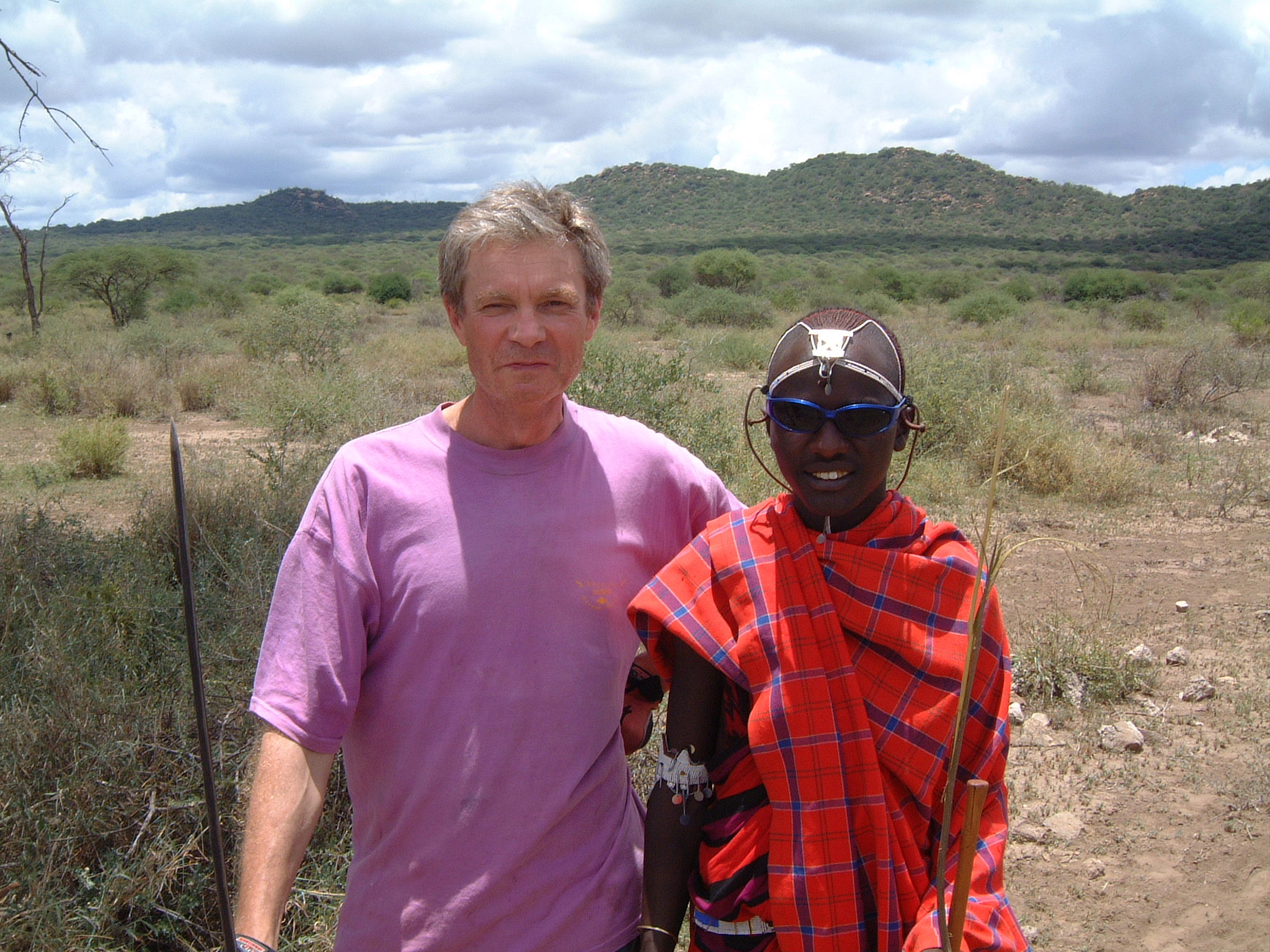
Henry Gold on the Tour D’Afrique.
You started to touch on this, but are there still big misconceptions about bike touring in Africa, maybe even from participants in the tour who come into it with a lot of apprehension?
Yeah, people are apprehensive. The most common question I’m asked is, “is it safe?” Yeah, it’s a total misconception. I answer the same every time, the most dangerous thing I do every day is cycle to work and back. Toronto is one of the most civilized cities in the world and I have more close calls here than anywhere else. I don’t mean that Toronto has more dangerous drivers, it’s just the fact of driving. The most dangerous thing to cyclists is not terrorism, it’s the cars. It could be a driver going way too fast or he’s looking at his phone when he should be looking at the road. The danger is not security, but the nature of the transportation system we have in the world.
Are you going to be on this whole five and a half month South America trip?
No I won’t be. I have already done a major trip to South America. We did a different trip that was four and a half months. I’m going to be on the beginning of this trip, which is new, and the end, which is new. The middle is similar to what I have done. I also have personal reasons. I have a 90 year old mother. For me to get away for five and a half months is just impractical at the moment. I also have a partner in life and she’s not very happy for me to disappear for that long. Especially since I just came back not that long ago from a four month trip to Indonesia and Australia we did last fall. I have to pace myself.
Where do you want to take the company from here?
I’m getting older. I think as far as coming up with new, wonderful cycling trips, none of us lack the ideas and ambition. Sometimes on Fridays we just have a beer and look at the big map we have on our wall here and say, “wouldn’t it be cool to go here?” etc. I think we’ll keep coming up with trips and keep experimenting and doing stuff like that. I think the company as a whole people are having fun working here. As long as we can keep growing and keep doing interesting trips and attracting participants, we’ll stick around.
Like what you read on The Bicycle Story? Support the work with a donation, by buying a shirt, or sharing it with your friends.
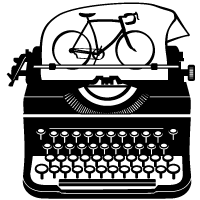
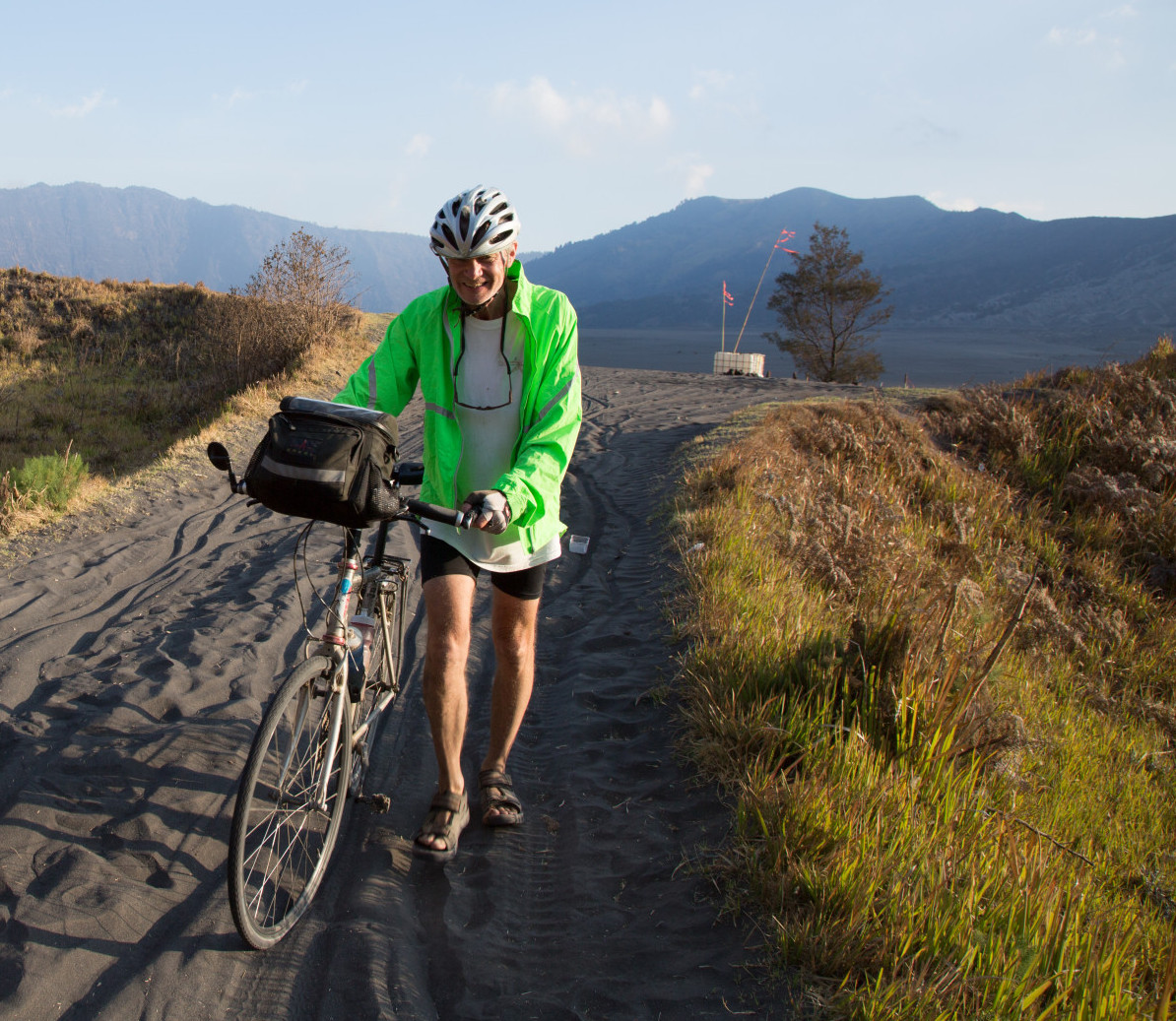
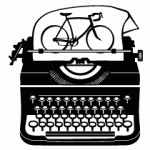
4 Responses to Henry Gold: Enabling Expeditions Around the World